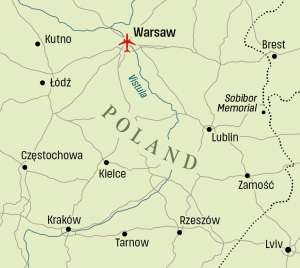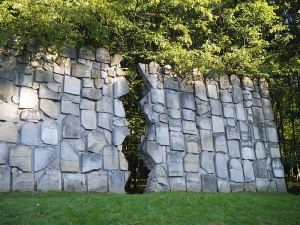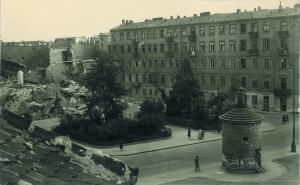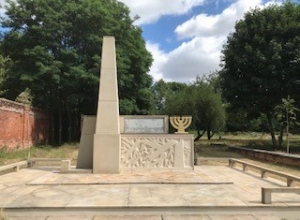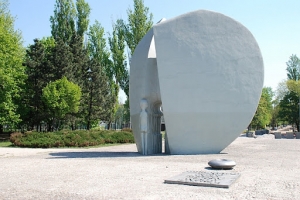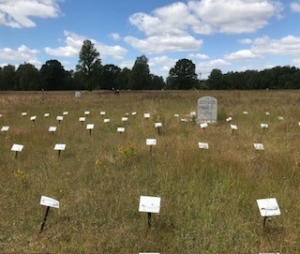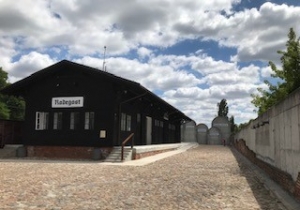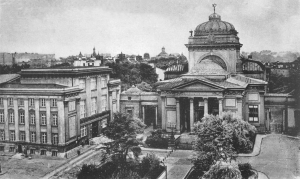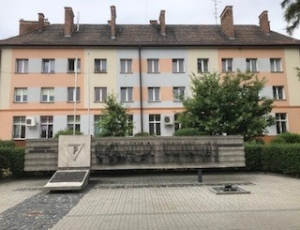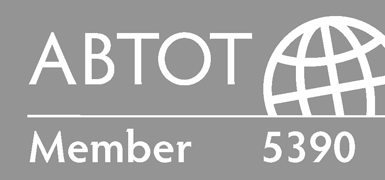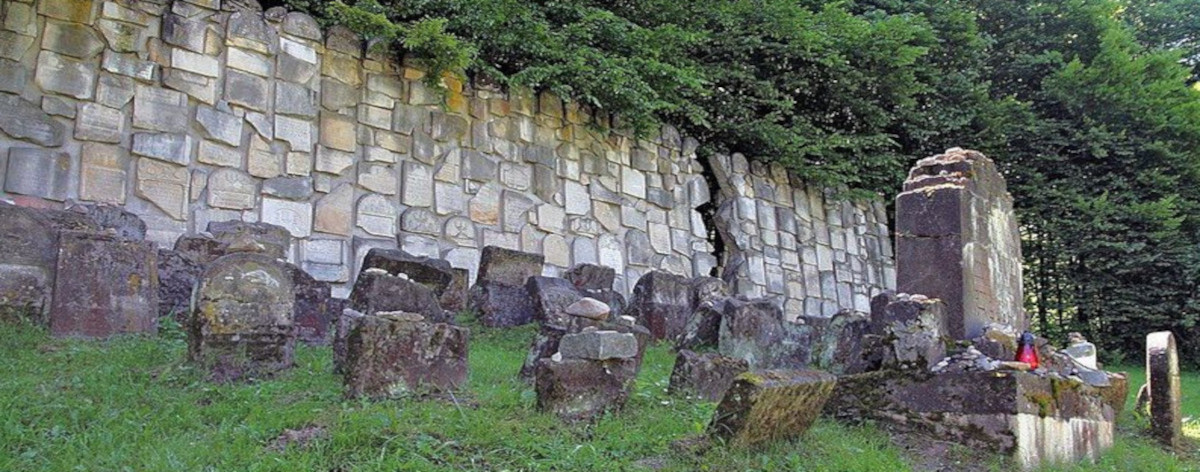
Polandís Forgotten Holocaust Sites
To be confirmed
Polandís Forgotten Holocaust Sites
Tour Introduction
In this 8-day tour we visit a number of lesser-known and, in some cases, forgotten, but nevertheless highly significant, sites of the Holocaust in Poland. In popular imagination, the Holocaust in Poland is primarily associated with the Warsaw ghetto, Treblinka and Auschwitz. This tour takes you to key sites related to the Lodz ghetto, the second largest ghetto in what is now Poland, and to Chelmno (Kulmhof), the first deathcamp to open in December 1941, i.e. before the Wannsee Conference. Chelmno was unique in relying on mobile gas vans, and was the only deathcamp to be closed down, dismantled, and then reactivated. It consisted of two sites, one in the village from where the gas vans departed (destroyed by the Germans). We visit the second site, in the Rzuchów Forest, the location of mass graves (where there is now a small museum and multiple memorials). We also visit Sobibor, the second of the Aktion Reinhardt camps, visiting the newly opened museum, which displays many objects found during recent archaeological excavations, and tells the story of the most ‘successful’ uprising to take place at a death camp. The tour travels through the historic cities of Warsaw, Lodz, Tarnow and Lublin, visiting former ghetto and massacre sites, cemeteries, prisons and transit points where we gain a deeper appreciation of the scale, and rapidly evolving, nature of the genocide. Tarnow is important for many reasons, not least the deportation of Poles from there on 14 June 1940 marks the formal opening of Auschwitz. A key feature of the tour will be to explore the many different forms resistance can take, and the complexity of Polish-Jewish relations, during and after the Holocaust. We will visit two recently opened museums celebrating ordinary Poles honoured as Righteous Among the Nations: the villa which was home to Jan Żabiński, director of the Warsaw Zoo, and his wife Antonina, who sheltered c300 Jews from the Warsaw ghetto, and the Ulma Family Museum of Poles Saving Jews in World War II in Markowa. Their story points to the complexity of Polish-Jewish relations, as they, and the eight Jews they were hiding were shot on 24 March 1944, probably as a result of betrayal by a local policeman.
Background
This tour visits key, rarely visited, sites connected to the rapid, multifaceted development of the Holocaust in what is now Poland. A recurring theme is the multiplicity of roles played by non-Jewish Poles in the Holocaust, as (heroic) resistors, Righteous Among the Nations, ‘bystanders’, economic ‘beneficiaries’ (the so-called ‘Golden Harvest’), and ‘co-perpetrators’ (betraying, even killing, their Jewish ‘neighbors’).
Łódź, prewar Poland’s second largest city, became part of the Warthegau, an area of western Poland incorporated into the German Reich, and site of one of the largest, earliest and longest lasting ghettos (spring 1940 to summer 1944). It was very different to ghettos in the Generalgouvernement. Mordechai Chaim Rumkowski, head of the Łódź ghetto’s Council of Elders, is one of the most controversial figures in the Holocaust, accused of complicity, collaboration even, because of his ruthless pursuit of a policy of ‘rescue through work’ to prolong the ‘life’ of his community. Chelmno (Kulmhof), the first deathcamp, opened on 8 December 1941, utilizing gas vans. Up to 200,000, predominantly from the Łódź ghetto and the Warthegau, were murdered there. Chelmno’s first commandant, Herbert Lange, played a key role in developing techniques of mass murder, facilitating the transition from ‘euthanasia’ killings to the purpose-built deathcamps of Aktion Reinhardt (Belzec, Sobibor, Treblinka).
Highlights
- Explore the story of the Holocaust in the historic cities of Warsaw, Lodz, Tarnow and Lublin
- Admire the remarkable stories of those who defied the Nazis by sheltering Jewish victims
- Visit the Marek Edelman Dialogue Centre, a centre for the promotion of toleration
- Visit the memorial sites at Ruszchow Forest and Zbylitowska Gora where so many Jewish victims lost their lives
- Visit the site of the Sobibor Extermination Camp, site of a dramatic prisoner breakaout
- Admire the Memorial Wall in a former Jewish cemetery near Kazimierz Dolny, widely considered the most powerful Holocaust memorial in Poland after Treblinka
What's Included
- 4 Star Hotels
- Return flights from London (optional)
- Expert historians throughout providing a daily variety of talks, presentations and Q&A
- Dedicated Tour Manager
- Dinner parties hosted by your expert historians and tour manager
- The company of like-minded travelers
- Helpful and friendly travel advice
- Meals as indicated in the itinerary
- Two drinks i,e wine or beer at each dinner and a welcome drink on first evening
- Entrance fees for sites included in itinerary
- Tour information booklet
- Modern, comfortable, air-conditioned coach
"I do not know what heroism is. Everyone does what they can."
Marek Edelman (1919 Ė 2009)
Itinerary
Day 1: fly from London to Warsaw or make your own arrangements to join the tour at the hotel. Hotel in Warsaw – 2 nights. (D).
Day 2: this morning we visit the exceptional Jewish Historical Institute and its permanent exhibition showcasing the remarkable underground archive of the Warsaw Ghetto. Then to the Żabiński Villa in Warsaw Zoo where hundreds of Jews were harboured by the Zoo Director and his wife Antonina. In the afternoon we visit the Pawiak Prison, located on the edge of the Warsaw ghetto, and a site of terror for both Jews and Poles engaged in resistance to the Nazis, and the superb Warsaw Rising Museum which relates the story of the brave attempt by the Polish Underground Resistance to liberate Warsaw from Nazi occupation in 1944. (B, D).
Day 3: today we leave Warsaw but not before visiting the site where Witold Pilecki, the remarkable ‘Auschwitz volunteer’, who effectively founded organized resistance in the camp and was captured in a street round-up. We then drive to the Chelmno nad Nerem (Kulmhof) museum in the Ruszchow Forest where Jews from the Łódź ghetto were murdered. Hotel in Łódź – 2 nights. (B, L, D).
Day 4: a full day in Łódź starting at the Jewish Cemetery, the largest in Europe, and dating back to 1892. Here lie 42,000 victims of the Łódź Ghetto the site of which was near the Radegast Station memorial which we now visit. We stop at the highly moving Monument to the Martyrdom of the Children of Łódź before visiting the Survivors’ Park and Marek Edelman Dialogue Centre, named in honour of a leader of the Warsaw Ghetto uprising, and set up to promote tolerance. (B, D).
Day 5: today we drive to Kielce, site of the most tragic and controversial post-war pogrom of Jews on 4 July 1946. We visit the pogrom site memorial and museum as well as the Old Synagogue and Jewish Cemetery. We then continue on to Tarnow, the population of which in 1939 was around 56,000, of whom approximately 25,000 were Jews. Mass shootings and deportations began in June 1942 when around 10,000 were deported to Belzec and others shot in nearby woods. We spend the late afternoon visiting sites including memorials marking the first transport of prisoners to Auschwitz, and the former Jewish Quarter, including the preserved Bima (platform from which the Torah was read) of a destroyed synagogue. Hotel in Tarnow – 1 night. (B, D).
Day 6: we move on to Zbylitowska Gora, site of the mass shooting of around 6000 Jews from the Tarnow ghetto (including 800 children), as well as Polish officers and members of the Underground State. We then drive to the Ulma Family Museum of Poles Saving Jews in World War II in Markowa honouring a family who hid Jews before being betrayed to the Nazis. This resulted in the murder of the family and all who they had protected, an event we reflect on in the beautiful Orchard of Remembrance. Drive to Lublin where we stay overnight. (B, L, D).
Day 7: on our last full day we drive to the former Extermination Camp at Sobibor, where on October 14, 1943 an uprising broke out and, after killing several SS guards, around 300 prisoners escaped. We return to Warsaw via the poignant Memorial Wall made from fragments of Jewish tombstones, in a former Jewish cemetery on the outskirts of Kazimierz Dolny, widely considered the most powerful Holocaust memorial in Poland after Treblinka. Hotel in Warsaw – 1 night. (B, L, D).
Day 8: fly from Warsaw to London or perhaps extend your stay in Poland. (B).

